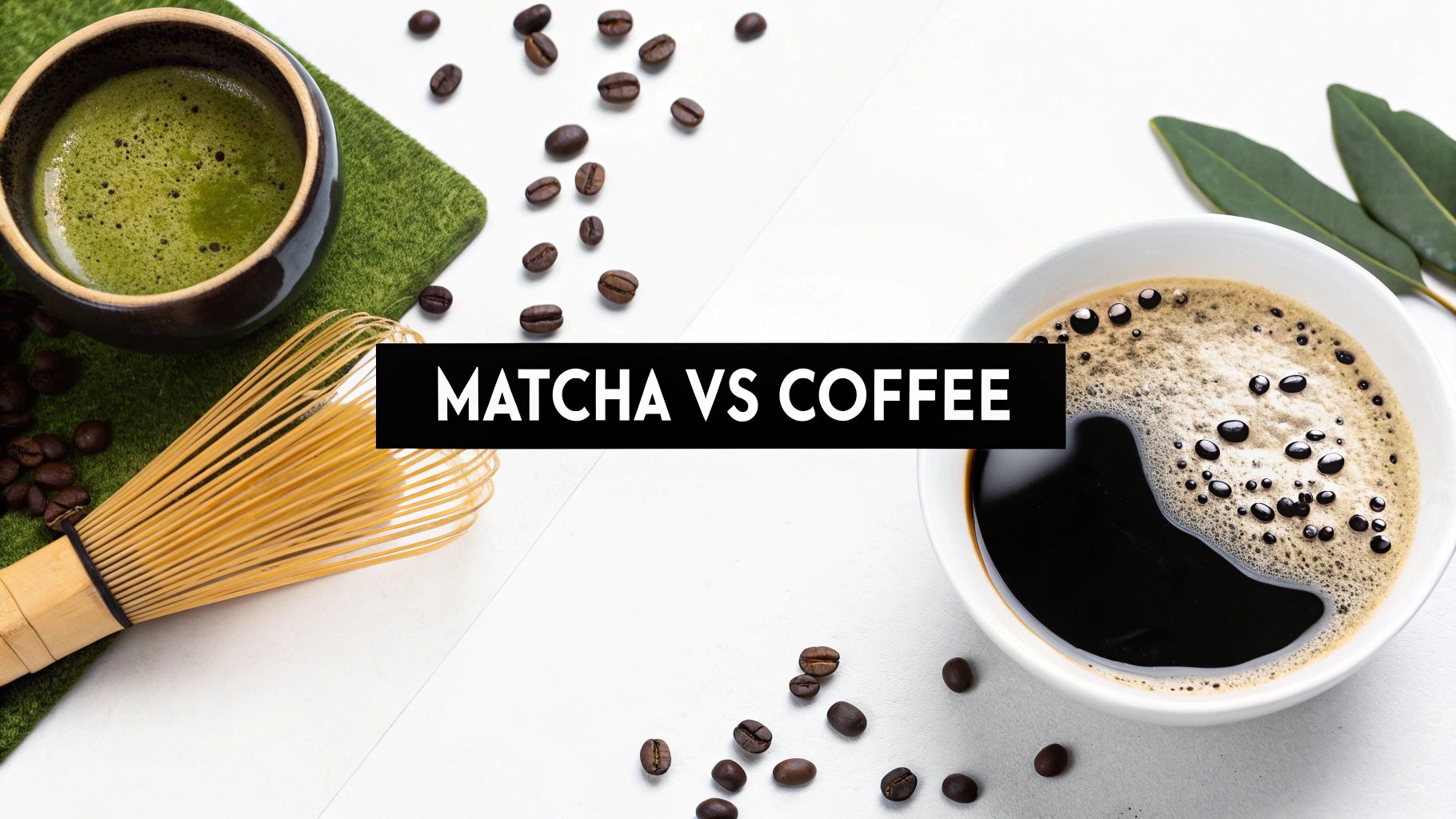When we talk about the caffeine in matcha versus coffee, it's not just a numbers game. The real story is in how your body processes it. Coffee gives you that immediate, powerful jolt, while matcha delivers a much calmer, more sustained alertness. This is all thanks to its unique combination of caffeine and an amino acid called L-theanine.
The result? You get focused energy without the infamous jitters or the dreaded afternoon crash. With Amatsu Matcha, you're not just choosing a drink; you're choosing a superior energy experience tailored to a modern, productive lifestyle.
Your Daily Energy: A Tale of Two Drinks
So, which one should you choose? It really depends on the kind of energy you're after. Do you need a quick, intense spike to power through a short, demanding task? Or are you looking for smooth, extended focus to carry you through a long, productive afternoon? Their distinct caffeine profiles hold the key.
This visual breaks down the typical caffeine journey for each drink, showing how long it takes to feel the peak effects.
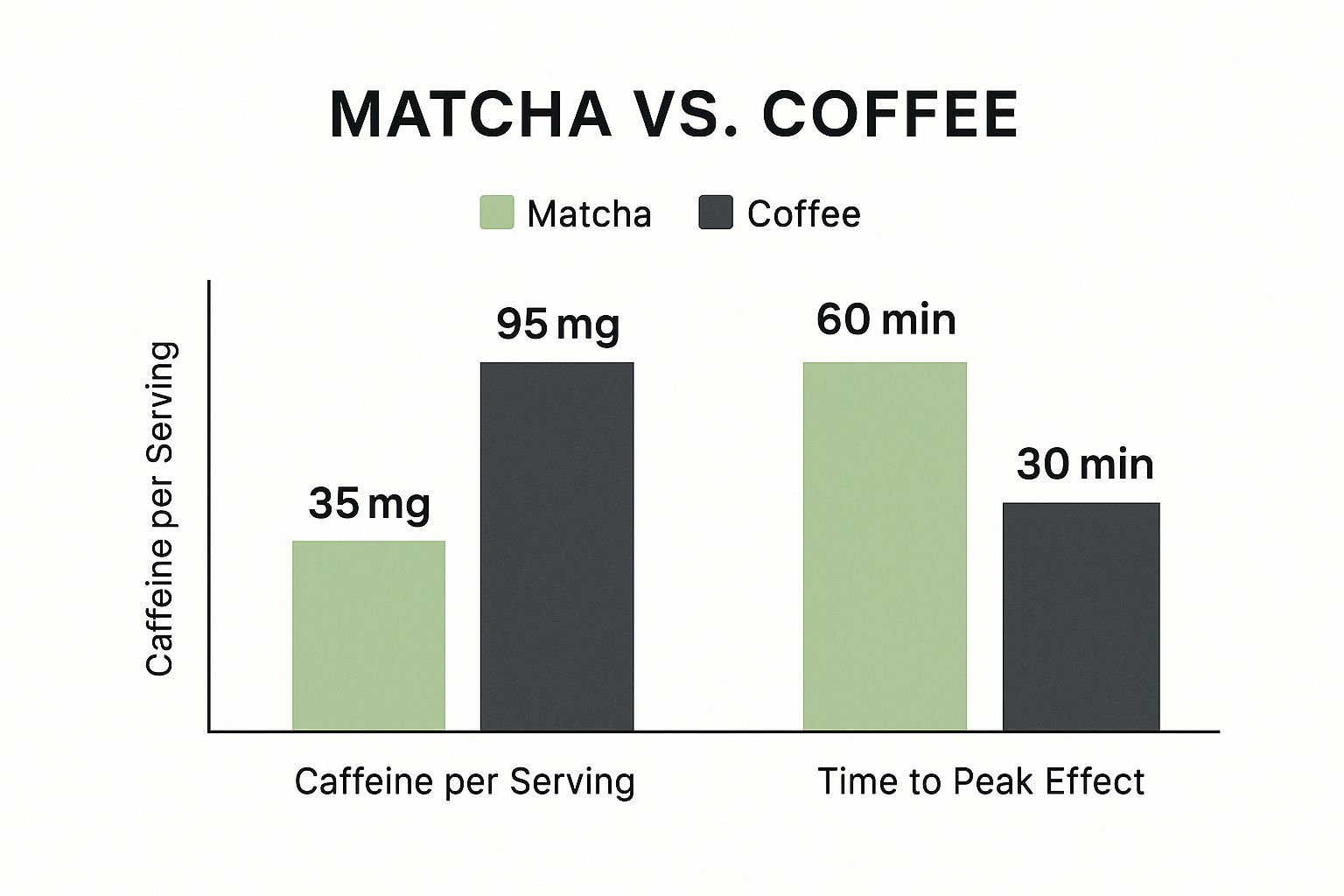
As you can see, coffee hits your system faster and harder. Matcha, on the other hand, offers a more gradual climb to a prolonged state of alertness. Grasping this fundamental difference is the first step in picking the right drink for your needs. For a deeper dive, check out our guide on why many consider matcha a better energy source than coffee.
Matcha vs Coffee At a Glance
To make the choice clearer, let’s put these two titans of the hot drink world side-by-side. This table gives you a quick summary of what to expect from each cup.
| Attribute | Matcha | Coffee |
|---|---|---|
| Energy Release | Slow, steady, and sustained for hours. | A fast, sharp spike followed by a potential crash. |
| How It Feels | Calm, alert focus without the jitters. | Intense alertness that can sometimes bring on anxiety. |
| Key Compound | L-theanine, which promotes a state of relaxed focus. | Caffeine, which blocks adenosine receptors to keep you awake. |
| Acidity Level | Lower in acidity, making it gentler on the stomach. | Higher in acidity, which can sometimes cause digestive issues. |
Ultimately, both are fantastic choices, but they serve different purposes. Your decision should come down to the kind of experience and energy profile you're looking for at any given moment.
Looking at the numbers here in the UK, a standard serving of matcha can contain anywhere from 40 mg to 180 mg of caffeine, depending on the quality and how you prepare it. A typical cup of brewed coffee sits around 80 mg to 100 mg. The biggest differentiator, though, is the duration. Matcha's energy is famous for lasting a steady 6 to 8 hours, making it a much more reliable choice for long-lasting vitality throughout your day.
How Your Body Uses Caffeine From Matcha vs Coffee
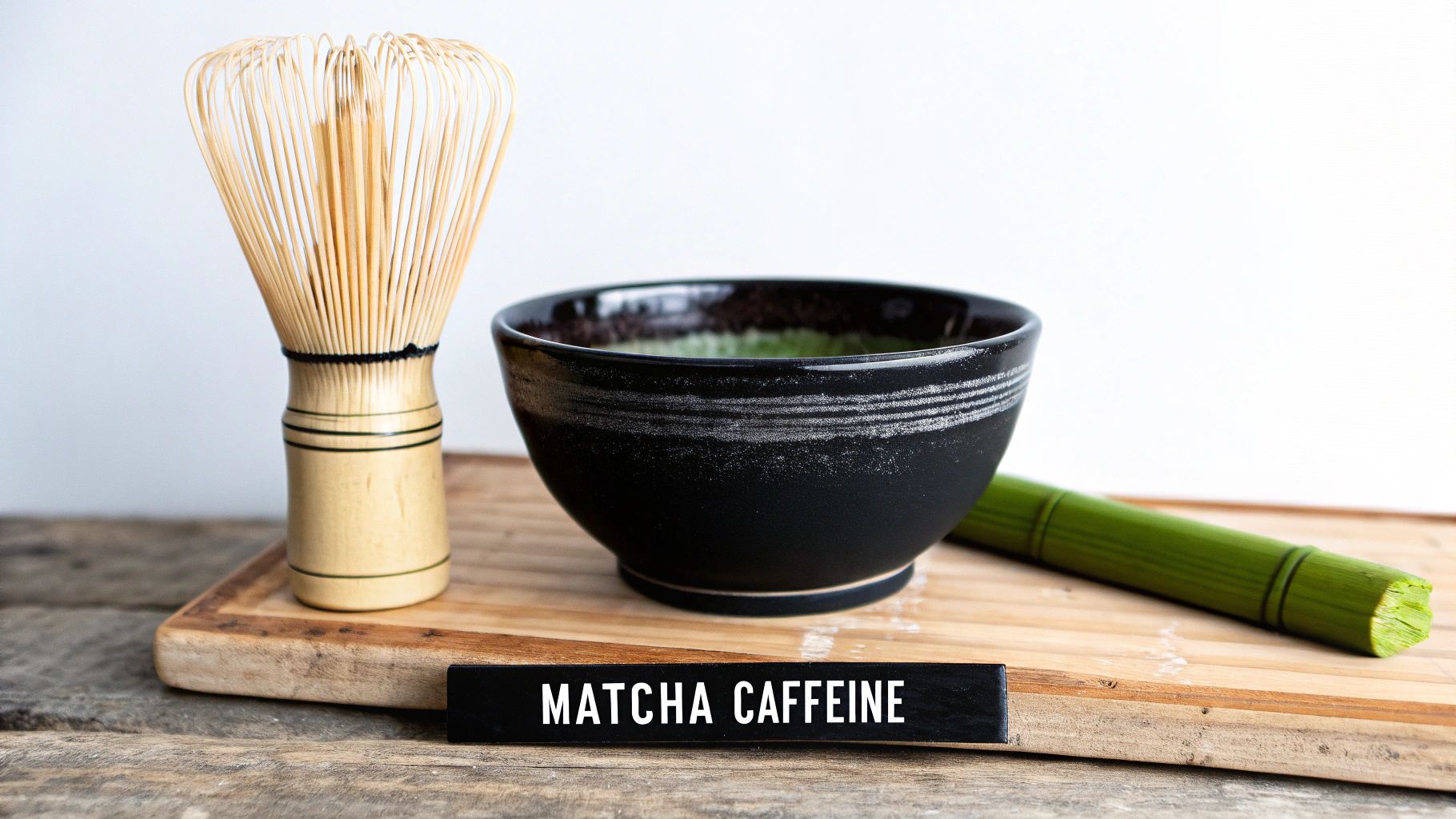
To really get to the heart of the matcha vs. coffee debate, we have to look past the caffeine count. The true difference lies in how your body actually processes the caffeine from each drink. It’s a fascinating story of two distinct chemical journeys, each leading to a very different kind of energy boost.
Coffee's effect is immediate and forceful. The caffeine hits your system and gets straight to work, blocking the adenosine receptors in your brain. Since adenosine is the chemical that tells your brain it's time to feel tired, switching it off creates a powerful, if temporary, surge of alertness. This is that classic jolt you feel after your morning espresso.
The downside? This rapid-fire mechanism is precisely why so many of us experience the dreaded coffee crash. Once the caffeine's effects fade, all that built-up adenosine comes flooding back, often leading to a sudden and dramatic energy slump.
The Matcha Difference: L-theanine and Calm Focus
Matcha plays by a completely different set of rules, largely thanks to a remarkable amino acid it contains called L-theanine. This compound is the secret ingredient that works in perfect harmony with caffeine, completely changing how your body absorbs and utilises it.
Instead of that sudden spike you get from coffee, L-theanine slows down the release of caffeine into your bloodstream. The result is a much smoother, more sustained energy lift that can last for hours, all without the jitters or crash. Think focused productivity, not frantic energy.
The L-theanine in matcha fundamentally changes how your body processes caffeine, creating a smoother, longer-lasting state of focused energy without the jitters.
What's more, L-theanine is known to stimulate the production of alpha brain waves. These are the very same brain waves associated with a state of 'wakeful relaxation'—the kind of calm, alert state you might find during meditation. This unique neurological effect is the secret behind matcha's renowned ability to foster a sense of calm alertness.
So, while coffee acts as a powerful but rather blunt tool for wakefulness, matcha offers a more refined, balanced energy. It supports both alertness and mental clarity, making it a fantastic choice for a focused and productive day.
Understanding Caffeine Content in UK Cafes
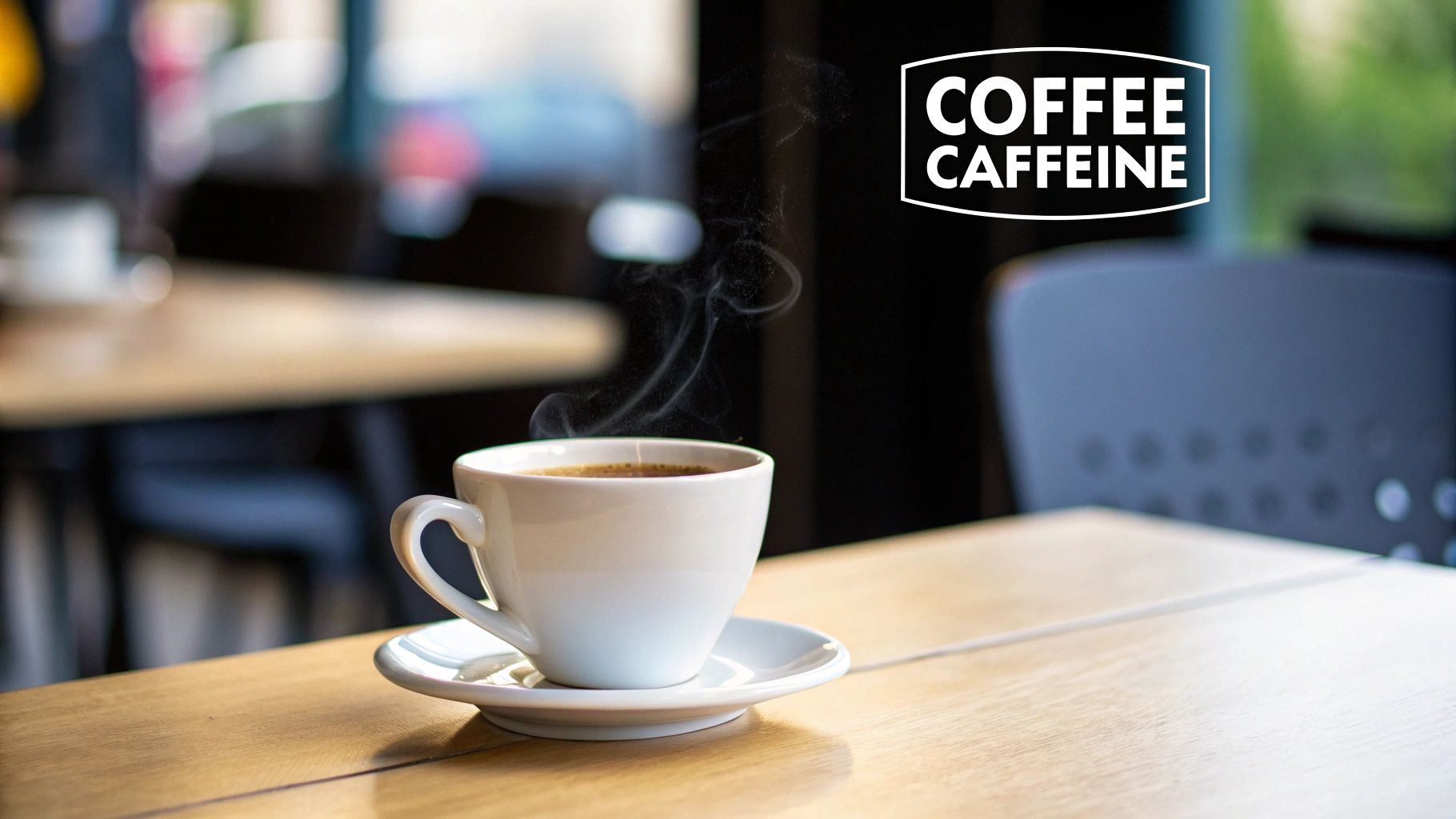
When you're weighing up matcha versus coffee, it helps to know what you’re actually getting in your cup. If you've ever stepped into a UK cafe for your daily coffee, you've probably realised it can be a bit of a gamble. There’s no standard for caffeine content, which means your energy boost can be wildly unpredictable.
This inconsistency can genuinely throw off your entire day. For example, recent research has shown just how much caffeine levels can vary across popular British coffee chains. A medium cappuccino from Costa Coffee might deliver a massive 325 mg of caffeine, while the filter coffee from Pret a Manger is also notoriously potent. This sheer unpredictability is where matcha starts to look very appealing.
It offers a much more dependable and consistent experience.
The Reliability of Matcha
Matcha cuts through the lottery of high-street coffee by providing a far more controlled and reliable caffeine dose. A standard serving of high-quality powder, like one from Amatsu Matcha, contains a steady, predictable amount of caffeine.
This consistency puts you back in the driver's seat. You can manage your energy intake with precision, neatly sidestepping the accidental overconsumption that so often leads to jitters and that dreaded afternoon crash. It’s what makes matcha such a smart choice for anyone wanting a clean, focused lift without the chaotic spikes.
With matcha, you're not just choosing a drink; you're choosing consistency. Its predictable caffeine level gives you reliable, calm energy every single time, putting you in control of your daily wellness routine.
This reliability is also a hallmark of preparing a quality cup at home. Our clear serving guides at Amatsu Matcha ensure you get that same dependable boost with every bowl you whisk. Of course, the quality of the leaves is paramount, which is why sourcing authentic, high-grade matcha is so crucial. To learn what to look for, you can read our guide on what defines premium organic matcha from Japan.
Ultimately, by choosing matcha, you're swapping the caffeine gamble for a consistently focused and balanced state of mind.
Comparing Health Benefits and Potential Downsides
When we look past the caffeine content of matcha versus coffee, we uncover two drinks with very different effects on our well-being. While both can be part of a healthy routine, their impact on everything from antioxidant intake to digestive comfort can be worlds apart.
Matcha's claim to fame lies in its incredible concentration of antioxidants, especially a powerful catechin called epigallocatechin gallate (EGCG). Since you're consuming the entire stone-ground tea leaf, not just steeped water, you get a far more potent dose of these compounds that help protect your cells.
These antioxidants are widely praised for supporting a healthy metabolism and helping the body combat oxidative stress. On top of that, matcha's brilliant green colour is thanks to its high chlorophyll content, a natural compound often associated with detoxification.
Balancing Benefits with Downsides
Coffee certainly has its own health credentials. It’s also packed with antioxidants and has been linked to several long-term health benefits. The main issue for many, however, comes down to its high acidity and the way its caffeine is delivered.
That classic coffee jolt can sometimes put a bit of a strain on your adrenal system over time. For anyone with a sensitive stomach, the acidic nature of a typical brew is also a well-known trigger for digestive irritation or discomfort.
Matcha offers a wealth of antioxidants like EGCG, supporting cellular health and metabolism. In contrast, coffee’s high acidity and sharp caffeine hit can lead to gut irritation and adrenal strain for sensitive individuals.
This difference is a major reason so many people are making the switch. For a more detailed look, you can read our complete guide on why matcha is often considered better for clean wellness.
With matcha, the most important thing to watch for is quality. Cheaper, lower-grade powders might not have the same rich nutritional profile and could even contain contaminants. To really get all the benefits without any unwanted extras, sourcing high-quality, ceremonial-grade matcha is key. This is why a trusted brand like Amatsu Matcha is so important—it guarantees a clean, potent, and beneficial experience in every single cup.
Why the UK Is Embracing Matcha Culture
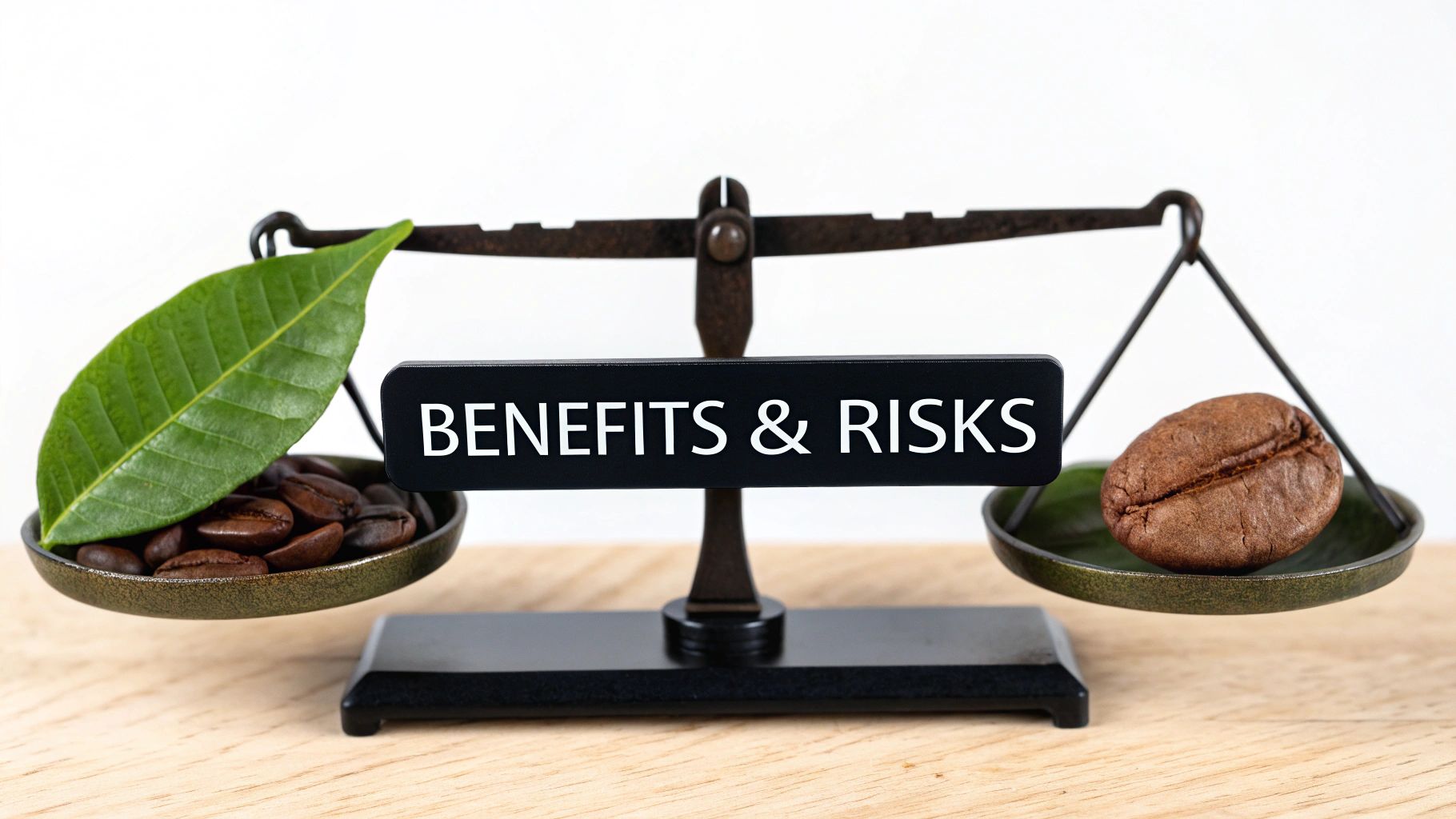
Something green is stirring in the UK’s traditional tea and coffee scene. Once tucked away in specialist health shops, matcha is now stepping into the spotlight, becoming a familiar sight in high-street cafés and kitchens right across the country.
This isn't just a fleeting trend; it’s a cultural shift. A new wave of health-aware consumers is actively seeking alternatives to the familiar, sometimes aggressive, jolt of coffee. They're looking for a cleaner, more balanced energy source that fits with a modern approach to wellness, and matcha's promise of calm, sustained focus is hitting the mark.
The statistics speak for themselves. Recent market research revealed UK matcha sales soared by an incredible 202% around 2023. This has propelled the market to a value of £45.3 million in 2024, with forecasts suggesting it will climb to £71.2 million by 2030. It’s clear this green wave has real staying power.
The Modern Appeal Of Mindful Energy
So, what's behind this remarkable rise? The wellness movement, amplified by social media, has played a huge part. Matcha is often framed not just as a beverage, but as a component of a more mindful lifestyle—a deliberate choice for balanced productivity over a frantic caffeine rush.
Choosing matcha is more than a preference; it’s a statement about prioritising steady, mindful energy over the unpredictable peaks and troughs of traditional caffeine sources. This shift reflects a deeper desire for controlled, productive wellness.
You can see this demand in action as major UK coffee chains now give matcha lattes pride of place on their menus. It's graduated from a niche curiosity to a permanent fixture in the nation's café culture. This is especially true in big cities, as we explore in our guide on why Londoners are ditching coffee for matcha.
As more people discover matcha, the need for a reliable, high-quality source is more important than ever. Brands like Amatsu Matcha are meeting this demand, delivering the authentic, ceremonial-grade experience that today’s discerning consumers are searching for.
Picking the Right Brew for the Task at Hand
When it comes to matcha versus coffee, there's no single winner. The real question isn't which one is better overall, but which one is the right tool for the job you have in front of you. Forget the simple caffeine numbers; it's all about what you need to achieve.
Think of it this way: if you’re about to hit a high-intensity workout and need an immediate, powerful kick, a shot of espresso makes perfect sense. That fast-acting caffeine delivers the instant burst of energy you’re looking for.
But what if you need to lock into a state of deep focus for an entire afternoon? That’s where Amatsu Matcha truly shines.
Match Your Drink to Your Day's Demands
For that big project or a marathon study session, matcha is the superior choice. The magic lies in its unique pairing of caffeine and L-theanine, which work together to provide 4-6 hours of smooth, calm alertness. You get the focus without the frantic energy or the dreaded coffee crash later. It’s the perfect companion for sustained mental effort.
You can take it a step further by choosing an Amatsu Matcha blend that’s fine-tuned for your specific goals:
- For Sustained Workday Focus: To power through your tasks with clean, vibrant energy, our Pure and Radiance blends are crafted to keep your mind clear and sharp all day long.
- For Enhanced Physical Performance: Looking for a potent pre-workout boost that won't leave you feeling jittery? Our Strength blend is engineered for exactly this purpose. You can learn more about this in our guide on using matcha with creatine as a natural pre-workout.
- For Cognitive Support and Calm: When the goal is to sharpen your focus while keeping stress at bay, the adaptogenic mushrooms in our Shrooms blend offer a balanced, brain-boosting experience.
Instead of asking which drink is "better," a more useful question is: which one is better for me, right now? Let your immediate energy needs guide your choice. For sustained focus and clean energy, Amatsu Matcha is the smarter choice.
Got Questions About Matcha and Coffee?
When you're trying to decide between matcha and coffee, a few key questions always come up. Let's tackle them head-on so you can figure out which one is the right fit for your daily routine.
Will Matcha Give Me Jitters Like Coffee Does?
For most people, the answer is a resounding no. The reason matcha doesn't typically cause jitters comes down to a unique amino acid it contains called L-theanine, which works to slow down your body's absorption of caffeine.
This creates a much smoother, more sustained energy lift. Instead of the sudden spike and potential crash you might get from coffee, matcha offers a feeling of calm, focused alertness. It's one of the main reasons people find themselves making the switch for good.
Think of it this way: coffee can sometimes give you a frantic, scattered energy. Matcha, on the other hand, provides a focused, clear-headed energy that's ideal for getting things done without the shaky side effects.
Is It Difficult To Make Matcha At Home?
Not at all! You might have seen the intricate traditional Japanese tea ceremony, which is a beautiful art form, but making a great-tasting cup of matcha at home is surprisingly straightforward.
With a quality powder from a brand like Amatsu Matcha, you’ll get simple instructions. All you really need is the matcha itself, hot water (not boiling!), and a basic whisk or an electric frother. You can whip up a creamy, delicious and healthy brew in just a minute or two.
Ready to feel the difference that calm, sustained energy can make? Explore the Amatsu Matcha collection and find the perfect blend to elevate your daily ritual. Discover our collection today.
Read more
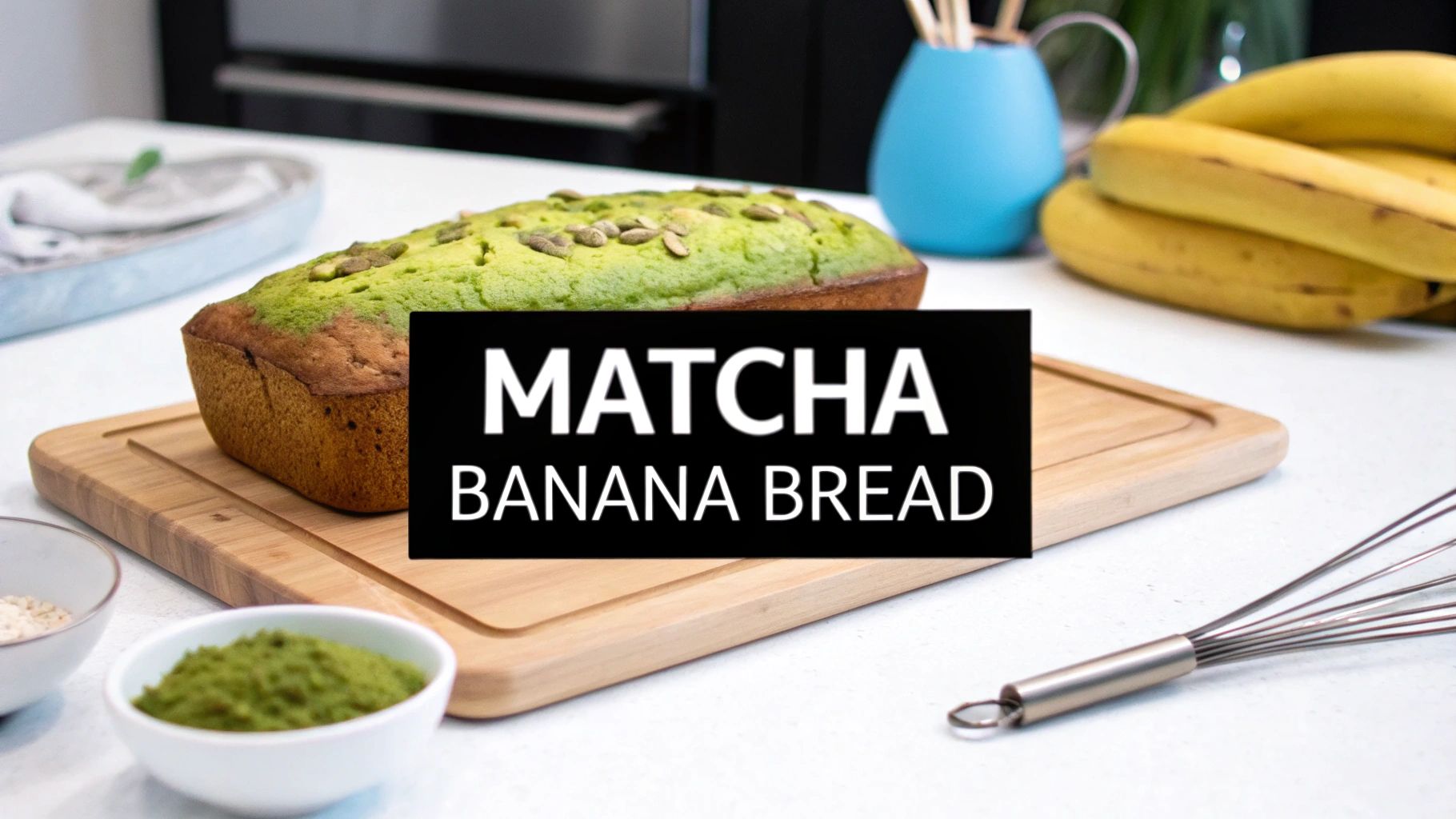
Bake the best matcha banana bread with this easy, foolproof recipe. Learn how to get a moist crumb, vibrant green color, and delicious flavor every bake.
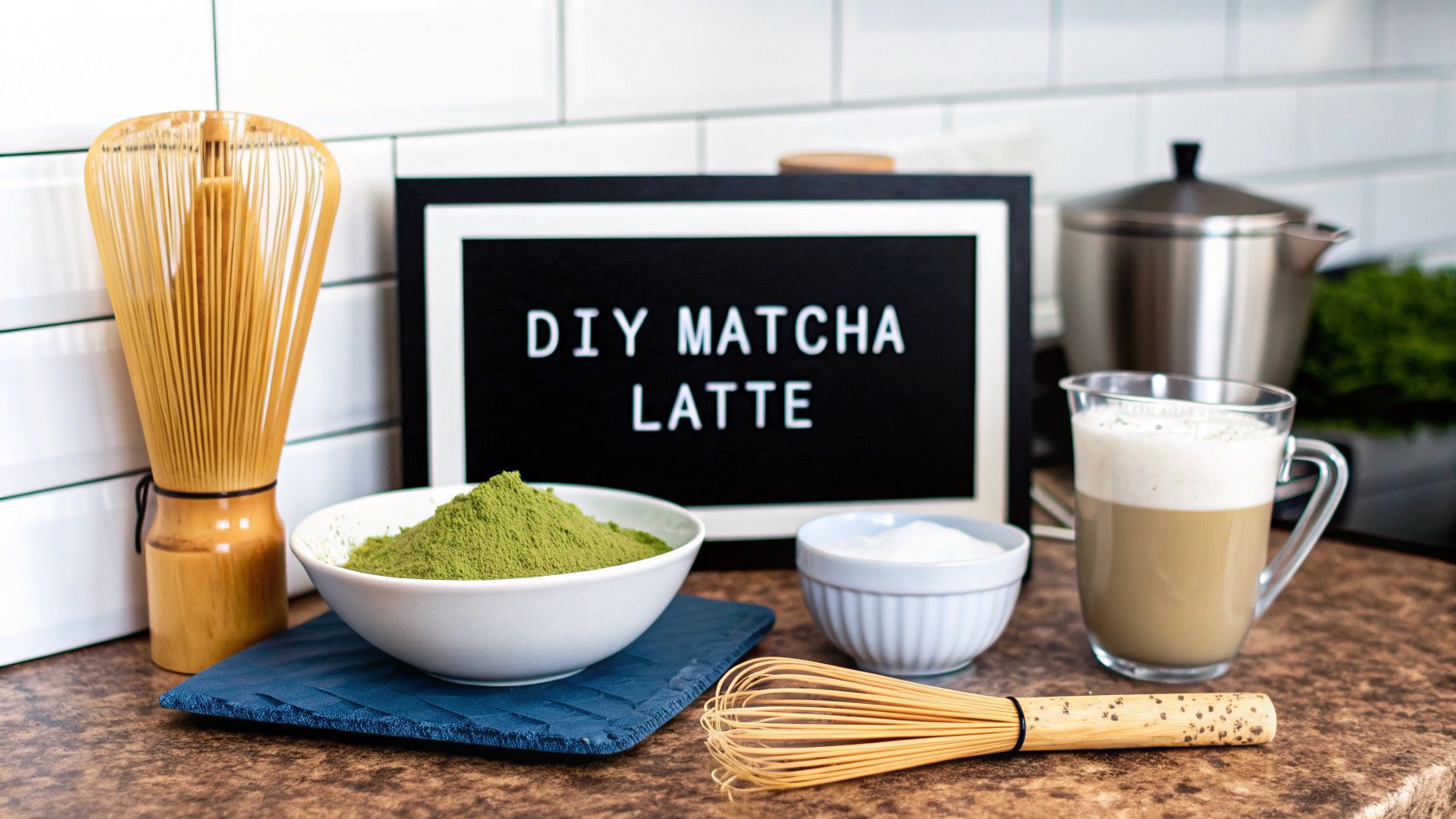
Learn how to make matcha latte at home with our simple guide. Discover tips on tools, ingredients, and techniques for a perfect café-quality drink.
